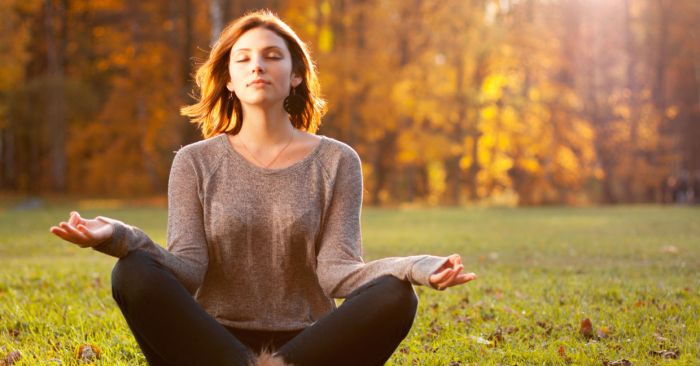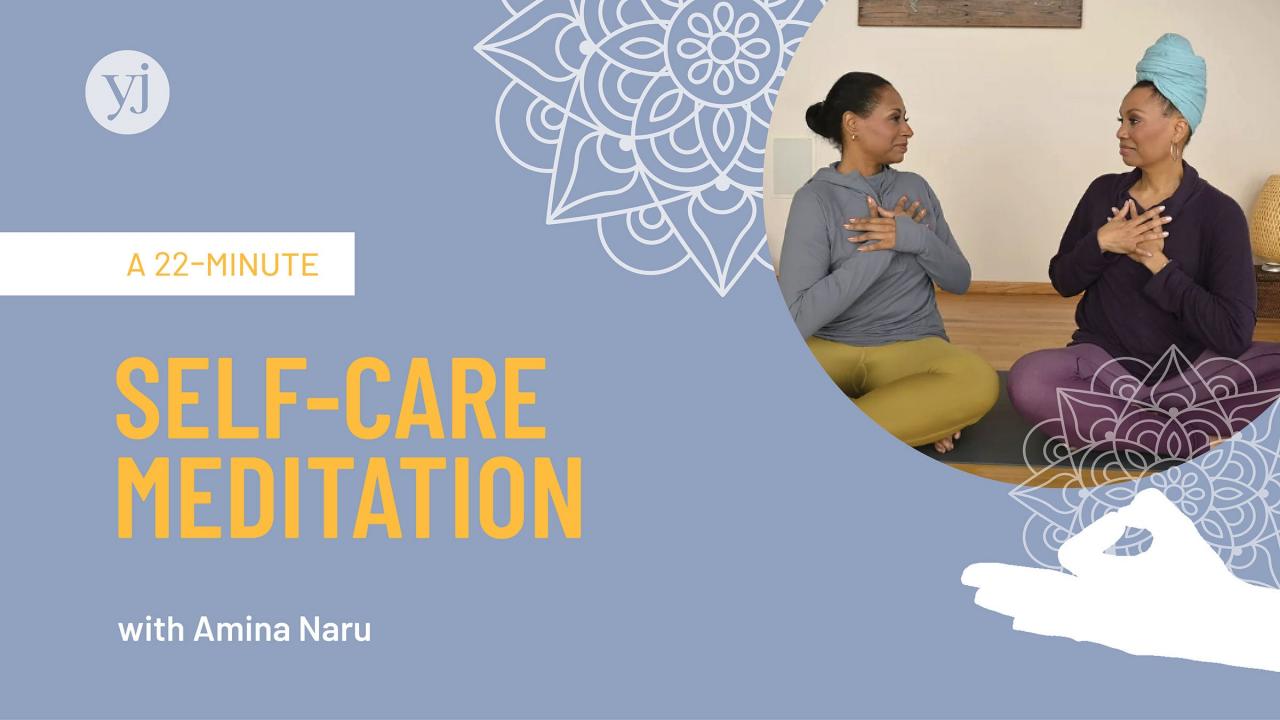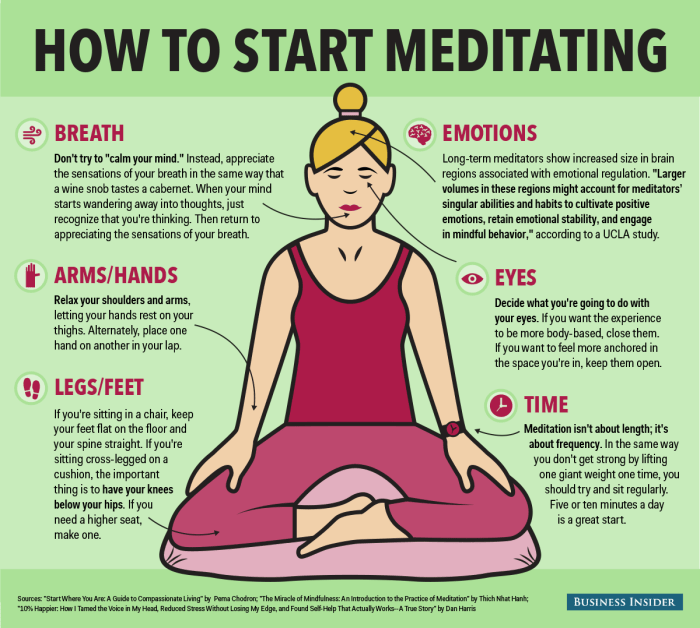How to Meditate for Self-Care and Personal Wellness takes center stage in this comprehensive guide, inviting you into a world of tranquility and self-discovery.
Explore the art of meditation and unlock its benefits for your overall well-being.
Introduction to Meditation for Self-Care and Personal Wellness: How To Meditate For Self-Care And Personal Wellness

Meditation is a practice that involves focusing the mind and calming the body to achieve a state of mental clarity and emotional stability. It has numerous benefits for self-care, including reducing stress, improving concentration, and promoting a sense of inner peace.
When it comes to personal wellness, meditation plays a crucial role in enhancing overall well-being. By incorporating meditation into your daily routine, you can cultivate a greater sense of self-awareness, boost your mood, and increase your resilience to life’s challenges.
The Importance of Incorporating Meditation into Daily Routines
- Meditation helps to reduce stress levels by calming the mind and promoting relaxation.
- Practicing meditation regularly can improve your focus and concentration, leading to increased productivity in daily tasks.
- By taking time to meditate each day, you can create a sense of inner peace and emotional balance, which is essential for overall well-being.
- Regular meditation practice can also help to improve sleep quality, reduce anxiety, and enhance self-awareness.
Types of Meditation Practices

When it comes to meditation, there are several types of practices that can be beneficial for self-care and personal wellness. Each type offers unique benefits for mental and physical health.
Mindfulness Meditation
Mindfulness meditation involves focusing on the present moment without judgment. This practice can help reduce stress, improve focus, and promote emotional well-being.
Loving-Kindness Meditation
Loving-kindness meditation focuses on cultivating feelings of love and compassion towards oneself and others. This practice can enhance empathy, reduce negative emotions, and foster a sense of connection with others.
Body Scan Meditation
Body scan meditation involves systematically scanning and bringing awareness to different parts of the body. This practice can help release physical tension, improve body awareness, and promote relaxation.
Setting Up a Meditation Space
Creating a peaceful and comfortable meditation space at home is essential for a successful practice. Here are some tips to help you set up the perfect meditation area.
Setting and achieving goals can be a daunting task, but meditation can provide the mental clarity and focus needed to succeed. By following the 10 steps outlined in this guide on How to Meditate to Achieve Your Goals: 10 Steps , you can align your thoughts and actions towards reaching your aspirations.
Choosing the Right Location
When selecting a location for your meditation space, opt for a quiet area free from distractions. Choose a spot with natural light if possible, as it can help create a calming atmosphere. Consider a corner of a room or a small nook where you can relax without interruptions.
When it comes to overcoming mental fatigue, meditation can be a powerful tool. By practicing mindfulness and deep breathing techniques, you can clear your mind and rejuvenate your energy levels. Check out this helpful guide on How to Meditate for Overcoming Mental Fatigue to start your journey towards mental clarity.
Setting the Ambiance, How to Meditate for Self-Care and Personal Wellness
To enhance the ambiance of your meditation space, you can add elements like candles, essential oils, or calming music. Consider using cushions or a comfortable chair for seating. Keep the area clean and clutter-free to promote a sense of peace and tranquility.
Designated Meditation Area
Having a designated space for meditation is crucial for maintaining consistency in your practice. When you have a specific area set aside for meditation, it becomes easier to focus and train your mind. It also signals to your brain that it’s time for relaxation and self-care, helping you get into the right mindset quickly.
For those looking to enhance concentration and focus, meditation offers a way to train your mind and improve cognitive abilities. By incorporating meditation into your daily routine, you can sharpen your mental acuity and achieve greater productivity. Explore the benefits of meditation with this guide on How to Meditate for Better Concentration and Focus.
Guided Meditation and Mindfulness Exercises
Guided meditation is a form of meditation where someone else leads you through the practice. It can be beneficial for beginners as it provides structure and helps them stay focused. Guided meditation often includes soothing music, visualizations, and prompts to help you relax and center your mind.
Mindfulness Exercises for Self-Care
- Body Scan: Start by focusing on each part of your body, one at a time, noticing any tension or sensations. This helps you become more aware of your body and release any stress or anxiety.
- Deep Breathing: Take slow, deep breaths, focusing on the sensation of air entering and leaving your body. Deep breathing can help calm your mind and reduce stress.
- Gratitude Practice: Take a few moments to reflect on things you are grateful for. This practice can shift your focus to the positive aspects of your life and promote feelings of contentment.
Finding Guided Meditation Sessions and Mindfulness Activities
If you’re looking for guided meditation sessions and mindfulness activities, there are various resources available:
- Mobile Apps: Apps like Headspace, Calm, and Insight Timer offer guided meditations and mindfulness exercises for different purposes.
- Online Platforms: Websites like YouTube and mindfulness blogs provide a wide range of guided meditation sessions for free.
- Local Classes: Check out community centers, yoga studios, or meditation centers in your area for in-person guided meditation sessions.
Incorporating Meditation into Daily Routine

Integrating meditation into your daily routine can have a profound impact on your overall well-being. Establishing a consistent practice is key to reaping the benefits of this ancient practice.
Creating a Meditation Schedule
- Choose a specific time each day to meditate, whether it’s in the morning to start your day off right or in the evening to unwind.
- Start with just a few minutes each day and gradually increase the duration as you become more comfortable with the practice.
- Use reminders or alarms on your phone to help you stick to your meditation schedule.
Combining Meditation with Self-Care Activities
- Pair meditation with activities like yoga, journaling, or a relaxing bath to enhance the benefits of both practices.
- Practice mindfulness while doing everyday tasks like cooking or cleaning to bring a sense of calm to your daily routine.
- Set aside time for a meditation break during work or study sessions to boost focus and productivity.
Overcoming Challenges in Meditation

When it comes to meditation, it’s not always rainbows and butterflies. There are common challenges that many people face during their practice. But fear not, for we have some tips to help you overcome these hurdles and make the most out of your meditation sessions.
Dealing with Distractions
Distractions are like pesky little mosquitoes buzzing around your peaceful meditation space. To combat this, try acknowledging the distraction without judgment and gently guide your focus back to your breath or mantra. You can also try visualizing the distractions floating away like clouds in the sky, allowing you to return to your center.
Maintaining Focus
Keeping your mind from wandering off to your to-do list or that embarrassing thing you did in third grade can be a challenge. One technique to maintain focus is to anchor your attention on a specific point, like the sensation of your breath entering and leaving your body. If your mind starts to wander, simply guide it back to this focal point with kindness and patience.
Importance of Patience and Self-Compassion
Patience, my dear meditator, is key. Rome wasn’t built in a day, and neither is a calm and centered mind. Be gentle with yourself and understand that meditation is a practice, not a perfect performance. Approach your practice with self-compassion, allowing yourself to stumble and start again without judgment. Remember, each moment of presence is a victory in itself.
Tracking Progress and Self-Reflection

Tracking progress and engaging in self-reflection are essential components of a successful meditation practice. By monitoring your development and evaluating the impact of meditation on your well-being, you can make informed adjustments and improvements to enhance your overall experience.
Benefits of Tracking Progress
- Allows you to see improvements over time
- Keeps you motivated and accountable
- Helps identify areas for growth and development
- Provides a sense of accomplishment and satisfaction
Methods for Self-Reflection
- Set aside dedicated time for introspection
- Focus on your thoughts, emotions, and reactions during meditation
- Ask yourself reflective questions about your practice
- Consider journaling as a tool for self-reflection
Role of Journaling and Mindfulness
Journaling can enhance self-awareness through meditation by allowing you to track your progress, reflect on your experiences, and gain insights into your thoughts and emotions. Mindfulness practices can further deepen your self-awareness by encouraging you to stay present in the moment and observe your inner workings without judgment.
Embrace the transformative power of meditation and embark on a journey towards a healthier mind, body, and soul.